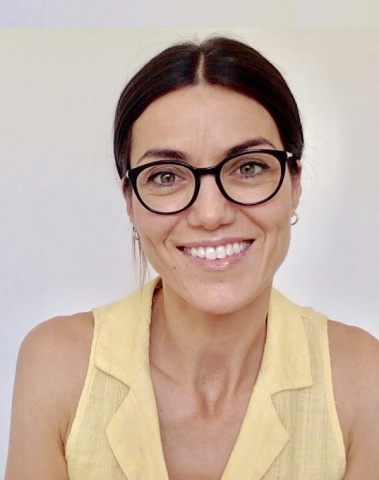My experience at the Ford School not only deepened my understanding of socioeconomic and political processes in the U.S., but also gave me more confidence in myself and the high-quality work I was capable of doing.

Inés Llorente
Prior to the Ford School: I grew up in Spain and completed a degree in Political Science and International Relations in France. I moved to Cambridge, MA and worked for the Unitarian Universalist Service Committee, a human rights organization with a growing immigration justice portfolio.
Why I chose an MPA: Having already worked for a number of years, I thought the MPA at the Ford School was the perfect option for me, because it was not only designed and offered by a leading school in public policy, but also because it provided the right combination of training in applied policy analysis and the development of high-level nonprofit management I was after. The MPA offers all of this, while not having to stop working for a significant amount of time.
How your classmates enhanced your experience: I was surrounded by students from diverse backgrounds with whom I shared the same passion for talking about big problems and helping others. It was tremendously inspiring. I am still in touch will some of them, and we are all, of course, connected through social media.
Inés Llorente (MPA '20) was working for a human rights organization when she realized she wanted to go back to school to focus on immigration policy and refugee integration. She is now the outreach and content manager at the International Rescue Committee.
What do you do at the International Rescue Committee (IRC)?
As the outreach and content manager of a national program, I help support and empower unaccompanied children with key resources and legal referrals to help them navigate the immigration process and life in the U.S. I’m proud to be part of an incredibly talented team and an organization with the capacity, experience, and global presence of the IRC. I’m proud of the background I bring to it as well as my experience working in many different countries.
What was one of your favorite courses at the Ford School?
It is difficult to name just one, although I do have a particularly good memory of PubPol 676 International Politics of Poverty and Development taught by professor Susan Walz. It was very interesting to tease apart the political and economic factors of poverty and development. Professor Walz did an excellent job at preparing us for the questions we would confront later in our careers and focus on the political conundrums that relate directly to differences in values, perspectives, and power.
Poverty and lack of opportunities are at the center of migration movements. The large differences in income between countries motivate individuals to escape poverty through migration. This course deepened my understanding of global migration dynamics and the existing linkages and knowledge gaps between migration and poverty. Having that broader understanding is important in my career.
What role did the Ford School play in helping you land your first job out of the program?
It was an accumulation of factors. Having on my CV a master’s degree from one of the country’s top public universities and one of the best public policy schools certainly helped. Also having an article published in a specialized journal conveyed the level of my writing skills and research abilities. Additionally, I joined a Ford School Graduate Career Services job search group and received great support and guidance.
The Ford school gave me a great confidence boost. I felt I had reached a point where I no longer had to rely on a job to confirm my value as a professional.
What is a memorable project you worked on?
With Human Rights First I researched travel bans imposed on human rights defenders in the MENA region and produced a report about it including my findings, analysis, and recommendations. The research was published in the Egyptian journal, Rowaq Arabi, for a special issue on the anniversary of the Arab Uprisings. A few weeks later, my article made it on the front page of the UN Special Rapporteur’s new website. I was over the moon when I saw it.
What is your best advice to an applicant trying to decide whether an MPA is right for them?
Talk to admission advisors, students, and alumni.
What is your best memory of your time at the Ford School?
Working on class projects with other students is one of my top memories. Grad school can get intense and stressful at times, especially if, like me, you are juggling coursework with being a parent of a toddler. I did not have much time to enjoy a lot of what the university offered, but working with other students on class projects brought me much closer to them. I have a particularly good memory of those times. That camaraderie formed among students is palpable. Also having gone through the beginning of the pandemic together and the switch from in-person to online classes the last month of the program really brought us together.
